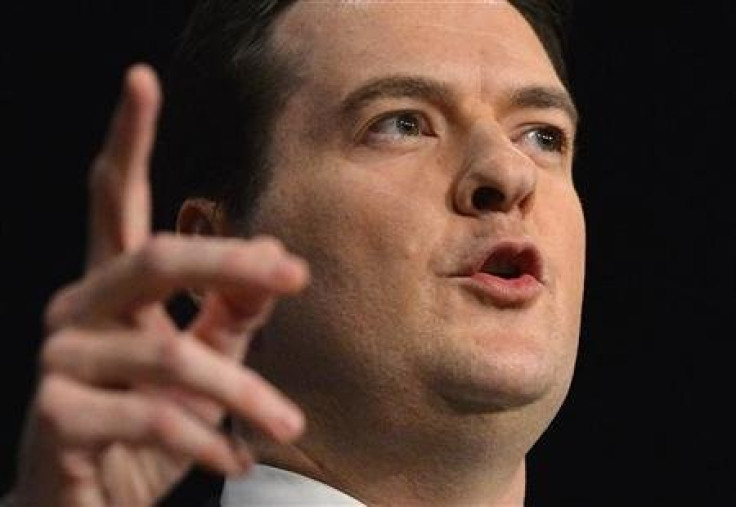George Osborne: Triple-Dip Won't Change Government's Fiscal Strategy

Chancellor George Osborne will stick with his "Plan A" fiscal strategy of government austerity despite the prospect of a triple-dip recession lurking in the background.
Speaking to BBC Breakfast, Osborne blamed the ongoing Eurozone crisis for constraining growth in the British economy, but insisted that the government's deficit-reduction strategy is working and the country's finances are on the path to recovery, despite public debt soaring to a record £1.1tn - or 70.7 percent of GDP.
"Britain cannot run away from the hard choices it faces," Osborne said on the BBC Breakfast programme, adding that the government is "absolutely determined to tackle the long-term problems of our country."
Official data shows the UK economy contracted by 0.3 percent in the fourth quarter, as falling oil extraction from the North Sea fields and flat output from the service sector, which accounts for around three-quarters of GDP, weighed heavily.
This figure from the Office for National Statistics is a preliminary estimate based on 40 percent of the information available, and may yet be revised up or down as the full picture emerges.
Britain's debt pile has soared since the coalition government took power in May 2010 as the economy undershot growth expectations, the eurozone's sovereign debt crisis hit exporters and austerity bit down hard on sectors such as construction, which relied on public contracts as a significant revenue stream.
The double-dip recession and elusive economic recovery has also hampered tax receipts, forcing the government to borrow more just to meet its outgoings.
It means Osborne will miss one of his key fiscal targets of bringing debt down as a portion of GDP by 2015 by at least a year.
Despite a general programme of austerity, which will last until at least 2018, the government has several initiatives and investment programmes to help mend the economy.
One is a Treasury-backed credit easing scheme carried out by the Bank of England, which sees banks offered cheap loans to a value linked to their lending to the real economy of individuals and small businesses.
Another is the UK Guarantees Scheme, worth £40bn, which sees the taxpayer underwrite the finances of shovel-ready infrastructure projects struggling to find private credit because of the squeeze on lending.
EU referendum
Conservative Osborne also told the BBC that he fully supports his party's promise of a referendum on whether the UK should remain in or out of the EU, to be held by 2018.
Critics, such as Osborne's coalition partners in the Liberal Democrats and the opposition Labour Party, say this will cause uncertainty for business, who will be deterred from making investment in the UK.
They also say that Britain reaps huge benefits from its trading relationship with the EU, which accounts for around half of the country's total trade.
However, many Britons feel they get a raw deal from the EU and that too much national sovereignty is lost to expensive, bureaucratic and unaccountable institutions in Brussels.
"A lot of big British businesses and small businesses have said one of Britain's problems is regulations from Europe," said Osborne.
"A big challenge is getting Europe to work better for us.
"The Conservative party is prepared to ask the people, and trust the people."
© Copyright IBTimes 2024. All rights reserved.






